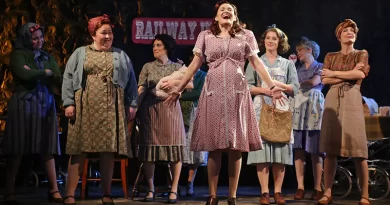“Buena Vista Social Club”, Gerald Schoenfeld Theatre, New York
Glenda Frank on Broadway
3 April 2025
Musicians are centre-stage here in this thrilling, rejuvenating musical about the passion for making music. It’s about the people, the choices, the talent – all set within the turmoil and troubled times of Fidel Castro’s overthrow of the military dictator Fulgencio Batista, when the island of Cuba was on fire. As the trombone and coronet sing, and the dancers leap and twirl (Patricia Delgado and Justin Peck, choreography) in their Fifties-style costumes (Dede Ayite) on Arnulfo Maldonado’s set, you can almost smell the ropa vieja and the arroz con frijoles negros. It’s that savoury.

Photo credit: Matthew Murphy.
The story (Marco Ramirez, book) centres on the legendary singer Omara Portuondo (“the Edith Piaf of Cuba,” the only female artist in the social club, b. 1930 and played by Natalie Venetia Belcon) as she is tempted to come out of retirement by Juan de Marcos (the amiable Justin Cunningham), a young music producer, to cut a tribute record. As de Marcos reminds us, some of the details in the legend are true, some are embellishments. Her return sparks memories of those heady days of discovering the forbidden social club and leaving behind what seemed a highly promising career to explore grass roots Cuban music.
Right alongside her, we find ourselves seduced by the outstanding instrumentalists: the showstopping Renesito Avich on tres (a six-string Cuban guitar-like instrument); Jesus Ricardo on trumpet; Eddie Venegas on trombone; the compelling, classically-trained Leonardo Reyna on piano; and Hery Paz with a surprising flute solo. These celebrated musicians are top of the line. Their work is exciting, adding colour throughout the performance. An older gentleman seated near me nodded and applauded as the roles of the celebrated musicians the performers played were named. Sometimes members of the audience, as a group, acclaimed a reference. Buena Vista Social Club is a tribute.
We meet the young Omara (the emotion-riven Isa Antonetti) as she and Haydee (Ashley De La Rosa) her elder sister are preparing for a performance at the Tropicana night club, a destination for foreign visitors and the well-to-do. Their accompanists can’t make it, but have sent replacements, Rubén (Reyna) and Compey Segundo (Julio Monge). They invite the sisters to the social club but only Omara joins them after hours. The club is in Marianao, a municipality of Havana reputed to be dangerous because it’s a black establishment. The choices that the sisters make foretell their destinies. Omara remains in Cuba; Haydee leaves for the United States. There are now two types of Cubans, Compey observes. Those who stayed and those who left.
The most difficult memory the older Omara (Belcon) struggles with is her relationship with Ibrahim (Wesley Wray), a black busboy at the club whose voice enchanted her as he sang “Bruca maniguá,” “a slave’s cry for humanity” full of complex harmonies. According to “Every Cuban Song Has a Story to Tell”, a booklet inserted into programmes, the song, written in 1937 by Arsenio Rodriguez, “was a bolt of lightning, a complete turning point in Cuban music”. The interwoven bits of history provide just enough background for us to understand the time, the energy and the dangers. Director Saheem Ali ensured that the 1959 and 1996 intertwining action is never confusing.
While Ibrahim remains an in-demand back-up singer, Omara, known for her impassioned renditions (as in “Lágrimas negras”) has again risen to the top of the industry. It adds a bittersweet undertone to the joy and excitement.
Tributes to the Buena Vista Social Club date back to the 1990s. In 1996 the album we are watching being created won a Grammy and transformed some of the island performers into celebrities. There was an international tour and a 1999 documentary. In 2023 a version of Buena Vista Social Club played off-Broadway, but the current production is sharper and the sound more vibrant at the Schoenfeld Theatre. What was a great story has become a living monument to the power of music.









